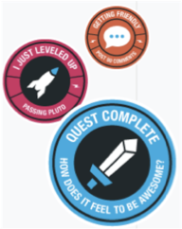Fitocracy is a great example of gamification applied to an everyday challenge that many people face – finding the motivation to get in better shape. The site describes itself as “the fitness social network to level up in real life.” In fact, Fitocracy – through both its website and related mobile app – is entirely designed around helping people find the motivation to progressively improve their fitness. Does it work? Launched less than two years ago, Fitocracy already has several hundred thousand users.
The site allows users to track their progress with points, levels, and badges. Exercises have different points values based on their level of difficulty, which provides an important feedback and tracking mechanism for users. Not accruing enough points? Well, you need to do more difficult exercises or to work-out more often.
And as users earn points, they can ‘level-up’. The social network’s mascot, FRED, keeps an ongoing tally of the points users earn, lets them know when they’ve reached another level and awards badges. Not only does the recognition feel good (who doesn’t like being told they’re “awesome”?), it importantly forms the basis of Fitocracy’s progression loop – a technique often used in video games – whereby the ultimate goal is broken down into smaller, more bite-sized goals. And as the term suggests, each level is progressively more difficult. This stands to reason; after all, someone who’s not in shape can’t expect to complete a really difficult work-out. But it’s fundamental to Fitocracy’s recipe for maximizing early and ongoing engagement: users begin at a level they’re comfortable with and can progress through increasing levels of difficulty and get motivating recognition along the way.
Moreover, it’s satisfying to reach a new level. This is another advantage of a progression loop structure; the regular completion of levels feels good and provides ongoing motivation.
Equally important in our view, is Fitocracy’s social network, which is anchored with their “Feed”. Like many other social networks, it allows users to share and compare with others within the community. This provides a great way for people to connect and to share work-out tips and to encourage one another towards their fitness goals, which can be a powerful motivation enhancement. It also allows user groups to propose challenges and individuals to engage in duels, effectively turning working-out into a competition.
By offering a range of interactive, social features from sharing, comparing, cooperating, to competing, Fitocracy is recognizing that different people have different behaviours and preferences. For example, some people will be highly motivated by the sense of community they feel by sharing and relating to others within their user group. Whereas, the die-hard competitive-type is more likely to get pumped at the prospect of beating others in fitness duels.
